- Home
- Patrick E. Andrews
Colorado Crossfire Page 9
Colorado Crossfire Read online
Page 9
“Was that your mouth harp?” Lefty asked. For an incredulous moment he forgot the peril he faced. “I got hit on the head by that damn thing. Tom Foyt says he threw it out the door of the saloon.”
“Mmm,” Phineus said thoughtfully as he rubbed his whiskered chin. Now his memory brought back a picture of Foyt grabbing his harmonica away from him and going to the door. The sight of the man flinging it out into the darkness was the last thing he could remember. “Yes. Yes. It was that dastardly man who hates music! An unlettered, untutored bumpkin who detests sweet, soothing sounds! It was that Philistine who cast my beloved instrument into the night.”
“Yeah. And it hit me on the head,” Lefty said.
“So you then shot Mr. Thomas Foyt, a human being, to death, did you?” Phineus asked.
“I did. But—”
“I pronounce these gentlemen innocent of all charges,” Phineus shouted. “Release them, I say. Discharge them from custody!”
“Wait a minute, Phineus!” the shopkeeper protested. “You can’t do that.”
“I most certainly can,” Phineus said. “I have been duly appointed judge by the consentaneity and accord of the good people of El Campo. I have reached a verdict and find the defendants not guilty.”
“What grounds, Phineus?” the shopkeeper asked. “Even I know you have to have some grounds for releasing them.”
“Grounds, sir? You speak to me of grounds?” Phineus said. “Very well. I release them on grounds of ... on grounds of ... on grounds of the advancement of the arts and sciences of civilization. By slaying – in self-defense, I’m sure – that barbarian Tom Foyt, they have assured the advancement of man in this wilderness.”
Lefty and Kiowa smiled at each other.
“Oh, no!” the shopkeeper said. “We ain’t gonna let ’em loose.”
The trapper who had testified against them again stepped forward. “We got to. He’s the judge.”
Lefty looked at the shopkeeper. “You got to turn us loose. Them’s the rules!”
But the shopkeeper wasn’t convinced. Angrily he pushed the settler back into the crowd. “We’re gonna hang these sonofabitches! And we’re gonna do it now!” The trapper turned, punching the shopkeeper in the face. Someone grabbed him and hammered him down with a heavy fist. Phineus Carrington, caught up in the fight, was pushed into some other men. They shoved him back and another wrestling match broke out between them and others. The men holding Lefty and Kiowa had to defend themselves as more brawls broke out in the immediate vicinity.
Kiowa wasted no time in squatting down. He stuck his hand into the side of his high-top moccasins. Withdrawing a knife, he quickly slashed Lefty’s bonds. Lefty took the knife and freed his friend. “Head for the horses!” Kiowa said.
He and Lefty charged into the crowd, punching wildly. They caught a couple of stiff blows to the face that staggered them. But desperation and fear gave them strength as they pummeled and kicked their way through the fighting mob.
The mêlée increased with each passing moment until a full-scale riot was in the making. The big fight went around like a prairie storm, circling and moving until it crashed into the side of the log saloon.
Lefty was grabbed from behind by some clear-thinking citizen and dragged back toward the main action. He choked and kicked, hitting back with his elbows until his captor was forced to let go. Whirling, he found himself looking at the mountain man who had testified against them. Lefty suddenly remembered that he had not been disarmed. He pulled his pistol fully intending to shoot the man dead.
“No! No!” The mountain man fled into the crowd, disappearing from view.
Kiowa grabbed Lefty’s arm. “C’mon! We ain’t got far to go.”
Meanwhile, the wall of the saloon gave way and collapsed inward. The lanterns inside were knocked to the dirt floor and smashed, their burning kerosene quickly spreading to other parts of the wooden building. Within moments the entire place was aflame.
Lefty and Kiowa leaped into their saddles for their second run for freedom that night. They made it, pulling on the reins and galloping for the dark forest country ahead. When they reached the edge of the settlement, they glanced back to see El Campo, flames exploding through the log buildings, about to be consumed by the fire.
Nine
Lefty squatted by the stream and gently splashed cold water on his face. Numerous bruises and scratches marred his freckled Irish features. He glanced over at Kiowa who was lounging beside their campfire. Lefty spat into the water. “I don’t see how it is that whenever you get in a fight you don’t never get marked.”
Kiowa stretched and yawned. “Us Injuns know how to fight, that’s how.”
“Goddamn, Kiowa!” Lefty exclaimed.
“We’re raised to keep from getting coup counted on us,” Kiowa pointed out. “It’s part of our war customs.”
“You must have some sort of big medicine going for you.,” Lefty allowed. “You was getting punched around as bad as I was.” He stood up and walked over to join his friend. “I think I got a coupla loose teeth.” Kiowa glanced at the empty tin plate resting near the fire. “I notice it didn’t keep you from eating your fill.”
“A man can’t starve just ’cause somebody smacked him in the jaw,” Lefty said. He sat down, leaning against his saddle. “That was a close call last night.”
“Sure was,” Kiowa said in agreement. “That was the worstest thing that’s happened to us. We’re lucky we got out of that one. Them rascals was fixing to hang us high and dry.”
“What makes me mad is that we know most of the bastards,” Lefty said.
Kiowa shrugged. “That might say something for our reputation, huh?”
“There ain’t nothing wrong with our reputation ’cept what that feller in the Denver jail said,” Lefty insisted. “We’re drifters, and drifters is always picked on.
“Ever’body in El Campo is a drifter,” Kiowa pointed out.
“At any rate, I don’t think we better go back to El Campo very soon,” Lefty opined.
“Me either.”
“We got one o’ the gang though,” Lefty said. He thought a moment. “That’s part o’ the job took care of. We might have near got did in, but we earned some money just the same.”
Kiowa was thoughtful. “That’s part o’ that thousand dollars they’re paying us.”
“Minus what happened when you set the livery stable on fire,” Lefty said.
“The hell you say!” Kiowa exclaimed. “You threw the lantern.”
“You started the trouble.”
“Forget it,” Kiowa wisely suggested.
“Anyhow, do you suppose we settled for less than we should have?” Lefty asked.
“Damn! I don’t want to talk about it,” Kiowa remarked. “You damn white folks is always hemming and hawing and pushing and tugging when it comes to your damn money.”
“I won’t argue about that,” Lefty said.
“We lost out when Paxton killed Dean Orman at Dawson’s Meadow,” Kiowa said.
Lefty sighed. “No, we didn’t. We’re getting paid a set amount; Can’t you remember nothing about business?”
Kiowa shook his head. “I don’t understand why everything has to do with money.”
“Well, it does,” Lefty said. “But, no matter, we’re least on our way to finishing up.”
“Hell! We ain’t hardly started,” Kiowa said. He sat up straight. “We got to make plans instead o’ just rushing in and trying to get some feller without any thought about it. Let’s look the situation over before we make any moves. Not like we done back there in El Campo.”
“Well, sure! But I got hit with that damn mouth harp,” Lefty said. “Things got outta control.”
“I’ll say!”
Lefty felt his forehead. “I got a knot from it, too.”
Kiowa chuckled. “You got more’n one now. Your face is so messed up I can’t tell for sure which mark is from that harmonica.”
“It don’t matter,” Lefty said with a s
igh. “What do you think we ought to do next?”
“We ain’t got much choice,” Kiowa answered. “We’ll just keep moving up into the mountains and poke around ’til something else happens. We’re sure to see one or more of Milo Paxton’s boys afore long.”
“I ain’t sure I could stand anything else,” Lefty said gingerly feeling the side of his sore jaw. “At least not for a while.”
Suddenly Kiowa leaned forward. “Shhh!”
“What?”
“Shhh!” he repeated. Then he whispered, “Listen!”
Lefty had learned many years previously to rely on Kiowa’s perceptions and instincts. From being so close to the Indian, he had developed some of those same intuitions that lie dormant in most civilized white people. He strained his ears for a few seconds, then nodded. “Yeah,” he said under his breath. “I hear it, too.”
Both young men picked up their carbines and crept away from the campsite to a spot some twenty yards away where dense vegetation grew alongside the mountain trail. Within moments the clear sound of hooves moving across the hardpacked earth could be easily discerned and they could hear a few clanking noises that could only be made by a laden pack animal.
“Prospector,” Kiowa said.
“Prob’ly.”
“I don’t think it’s a lynch mob,” Kiowa figured.
“Unless they’re sending a scout ahead,” Lefty cautiously pointed out.
Five minutes later an old man came into view. He walked slowly but steadily along the track that headed higher into the mountains. He led a burro that carried a packsaddle loaded with supplies and tools.
Lefty nudged Kiowa. “Ain’t that the old feller that played the mouth organ?”
“Yeah,” Kiowa said. “Let’s talk to him and find out what’s going on down in El Campo. He’d know if they was planning on coming after us.”
“Good idea!”
They stepped out on the trail. Phineus Carrington came to a surprised halt. “Hold it, my lads!” he said seeing the well-armed duo. “I have not a cent of the government’s specie nor paper currency on my person.”
“That’s alright, old-timer,” Lefty said. “We—”
“Nor am I in possession of a speck of silver or gold,” Phineus continued. “I have, only this very day, struck out on a new endeavor to search out the riches that are hidden by nature in these rugged and beautiful mountains.”
Kiowa held up a restraining hand. “Mister, we ain’t got any plans to rob—”
“And if I strike it rich,” Phineus said. “I shall take all that money and do good with it. I shall be known as the world’s benefactor. I shall be spoken of as a man of kindness, sympathy, and generosity with naught in my heart but thoughts of aiding my fellow man.”
Kiowa nodded. “Sure. What we—”
“So in delaying or bringing harm to my person only serves to hurt the human race, lad,” Phineus said. “Believe me that!”
“Shut up, mister!” Lefty snapped.
“If you wish, young sir.” He took a closer look at the two. “Ah! You are the fellows who ran afoul of El Campo’s credence of legal behavior, are you not?”
“What?” Kiowa asked.
“We was the ones they wanted to lynch,” Lefty said.
“Well! They forgot you quickly enough in the conflagration that devoured that primitive metropolis,” Phineus said.
Lefty frowned. “You’re kinda hard to understand.”
“Yeah,” Kiowa echoed. “What the hell happened back there after we left?”
Phineus decided to make a simple statement. “It burned down.”
“Now ain’t that something?” Kiowa observed.
“We was wondering if you’d like to come over to our camp and sit a spell,” Lefty said.
“While I am, indeed, grateful to your invitation, I have only just begun my journey,” Phineus said. “I cannot tarry—” He paused. “Do you, by chance, have any ardent spirits?”
“Sir?” Lefty asked.
“Is there liquor available at your camp, young man?” Phineus said rephrasing himself. “Gin, beer, brandy, bourbon—”
“We got a coupla bottles of rye whiskey,” Kiowa said interrupting.
Phineus’ features burst into a wide smile. “I would be pleased to join you. Lead on, comrades of the trail, and we shall commune with ourselves while inbibing in the aqua vitae, so to speak.”
Phineus followed Lefty back to the camp. Kiowa stayed by the trail long enough to wipe away the tracks and remove any sign that anyone had left the trail and entered the woods at that point. When he’d finished and returned to the camp he found Lefty and Phineus lounging around the dying campfire. The burro had been unloaded and the prospector was taking a healthy swallow from the bottle of rye.
“Looks like you ain’t in any hurry,” Kiowa said joining them.
Phineus shook his head. “The riches that I seek have been in these mountains for eons, my boy. A day or two more won’t diminish their worth.”
“His name is Phineus Carrington,” Lefty said. He turned to the old man. “Phineus, this is my pard the Kiowa Kid. You can call him just plain Kiowa.”
Kiowa sat down, “Is them bastards back in El Campo coming after us?”
Phineus took another swallow then shook his head. “No, my boy.” He laughed. “They are quite busy with other matters. Rest easy, my lads. You are gone and forgotten. At least for the moment. I would not advise an early return, however. They may be a trifle angry over their charred property.”
“We’ll stay away alright,” Lefty said.
“I heard them folks back there say you was a lawyer,” Kiowa said. “Is that right?”
“Indeed it is,” Phineus said. “I maintained a lucrative practice in Philadelphia for several years.” He hit the bottle again, coughing a bit on the cheap, raw liquor. “But a combination of wanderlust and a fondness for John Barleycorn ended my career. I came west a decade ago.”
“And you ended up in El Campo, huh?” Lefty asked.
“I was staying overnight to refresh myself and renew the vigor in my ancient body before entering the wilds to renew my search for precious minerals,” Phineus said.
“Any place in particular you’re headed?” Kiowa asked.
“I certainly am,” Phineus said. The alcohol hit the old drinker hard and fast. “I am in search of a silver mine that history reputes to be up here. It was first discovered by a Spanish conquistador.”
“What’s that?” Kiowa asked.
“An old explorer,” Phineus said. “Have you not heard of Francisco Vasques de Coronado who came into what is now our beloved homeland in a futile search for the lost cities of gold?”
“No, sir,” Lefty said.
“Us Kiowas don’t know nothing about it.”
“Nevertheless, it is a tale of historical accuracy. But Coronado’s venture was futile. He found no cities of gold,” Phineus said. “But one of his officers, a Capt. Juan Luis Vuscadero, took some men and traveled farther north into the very territory in which we now repose. He discovered silver somewhere around here, young gentlemen. A mountain, if you will, of pure silver!”
“Lord above!” Lefty exclaimed.
“That’d make a feller rich,” Kiowa said.
“A fellow? One fellow?” Phineus said. “My good young sir, it would make hundreds of fellows wealthy beyond their wildest dreams.” He treated himself to another gulp, dribbles of the whiskey running down into his whiskers. “I call the place El Capitan after the captain.”
“Boy! I’d sure be proud to find El Capitan,” Kiowa said.
“Me, too,” Lefty said.
“I could use a couple of young strong bucks like yourselves,” Phineus said. “There would be plenty to go around.”
“You’d let us join up with you?” Lefty asked.
Phineus nodded drunkenly. “It would be to our mutual advantage, believe me.”
“The only trouble is that we’re on a job right now,” Kiowa said. “But we could jo
in up with you after we’re finished.”
“You are engaged in a commercial endeavor?” Phineus asked. “Is that what brings you into the high country?”
“No, sir,” Lefty replied. “We’re hired to hunt down some fellers for the Northwest and Canadian Railroad.”
“Are you under contract?” Phineus asked. Then he realized they might not understand what he meant. “Have you signed any paper promising to perform that task?”
“No, sir, we ain’t,” Kiowa said.
“Then, sirs, you are under no legal obligation to continue the employment,” Phineus advised them.
“But we shook on it,” Lefty said.
Phineus smiled and nodded. “That simple direct honesty is the most attractive and engaging aspect of life out here that I have found.” He finished the bottle and threw it into the bush. “Which rascals are you searching for, lads?”
“Milo Paxton and his gang,” Lefty answered.
Phineus winced. “May God have mercy on your souls!”
~*~
Jim Bigelow dug his heels into the horse’s flanks to hurry up the animal’s pace as they rode up the final rise on the mountain trail. Russ Wilson, dose behind, crowded next to him on the path. They topped the high terrain and began the gradual descent down to the edge of the forest. When they came through the heavy vegetation and emerged into open country, Bigelow abruptly reined in.
“Goddamn!”
“What the hell happened?” Wilson asked.
The settlement of El Campo, normally a collection of tents, log structures, and shanties, was a blackened smoldering scene of desolation. The two detectives could see individuals picking through the charred rubble trying to salvage what they could from the ruins.
Bigelow and Wilson rode on in, coming to a stop at the nearest pile of charred wreckage. They nodded to the man kicking at the rubble. “Howdy.”
“Howdy,” the man said looking up.
Bigelow took another glance around at the results of what could only be a major calamity. “What the hell happened?”

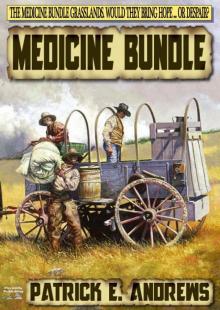 Medicine Bundle
Medicine Bundle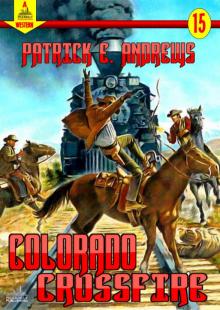 Colorado Crossfire
Colorado Crossfire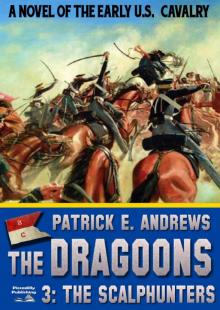 The Dragoons 3
The Dragoons 3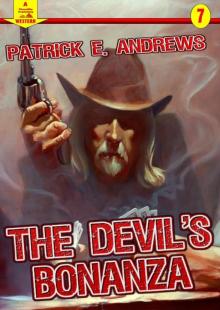 The Devil's Bonanza (A Piccadilly Publishing Western Book
The Devil's Bonanza (A Piccadilly Publishing Western Book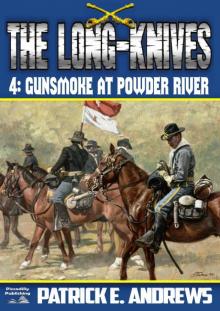 Gunsmoke at Powder River (The Long-Knives #4)
Gunsmoke at Powder River (The Long-Knives #4)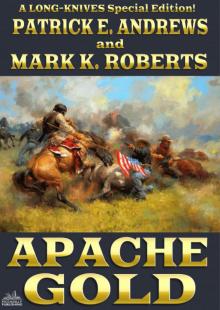 The Long-Knives 6
The Long-Knives 6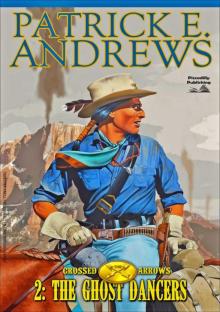 The Ghost Dancers (A Crossed Arrows Western Book 2)
The Ghost Dancers (A Crossed Arrows Western Book 2)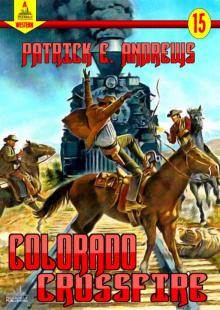 Colorado Crossfire (A Piccadilly Pulishing Western Book 15)
Colorado Crossfire (A Piccadilly Pulishing Western Book 15)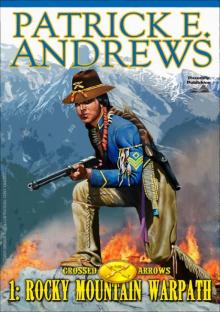 Rocky Mountain Warpath (A Crossed Arrows Western Book 1)
Rocky Mountain Warpath (A Crossed Arrows Western Book 1)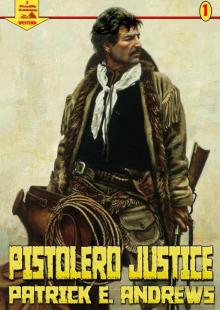 Pistolero Justice (A Piccadilly Publishing Western
Pistolero Justice (A Piccadilly Publishing Western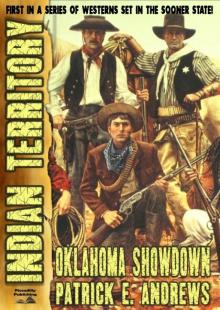 Oklahoma Showdown (An Indian Territory Western Book 1)
Oklahoma Showdown (An Indian Territory Western Book 1)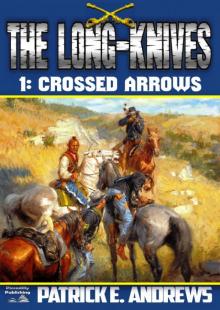 Crossed Arrows (A Long-Knives Western Book 1)
Crossed Arrows (A Long-Knives Western Book 1)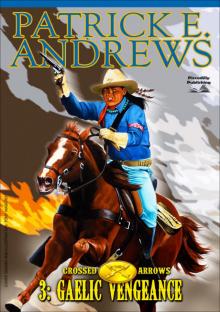 Crossed Arrows 3
Crossed Arrows 3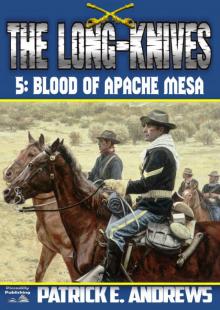 Blood of Apache Mesa
Blood of Apache Mesa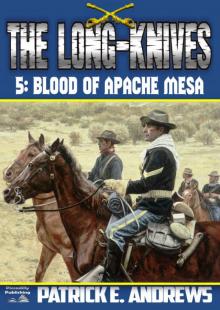 The Long-Knives 5
The Long-Knives 5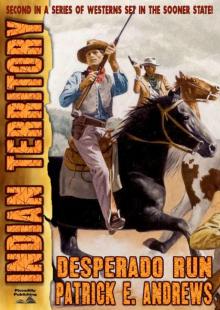 Desperado Run (An Indian Territory Western Book 2)
Desperado Run (An Indian Territory Western Book 2)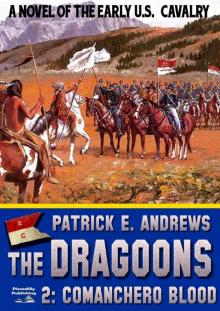 Comanchero Blood (A Dragoons Western Book 2)
Comanchero Blood (A Dragoons Western Book 2)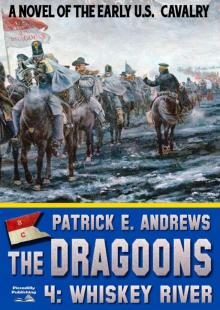 The Dragoons 4
The Dragoons 4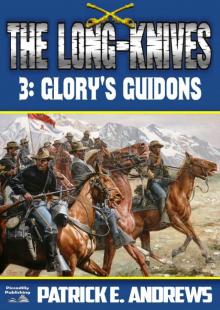 Glory's Guidons (The Long-Knives US Cavalry Western Book 3)
Glory's Guidons (The Long-Knives US Cavalry Western Book 3)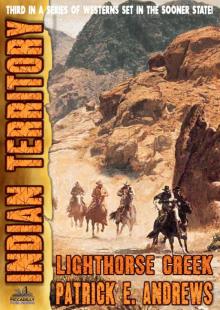 Indian Territory 3
Indian Territory 3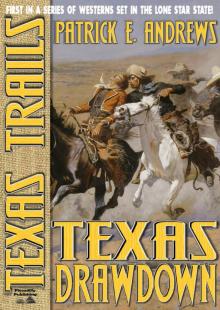 Texas Trails 1
Texas Trails 1